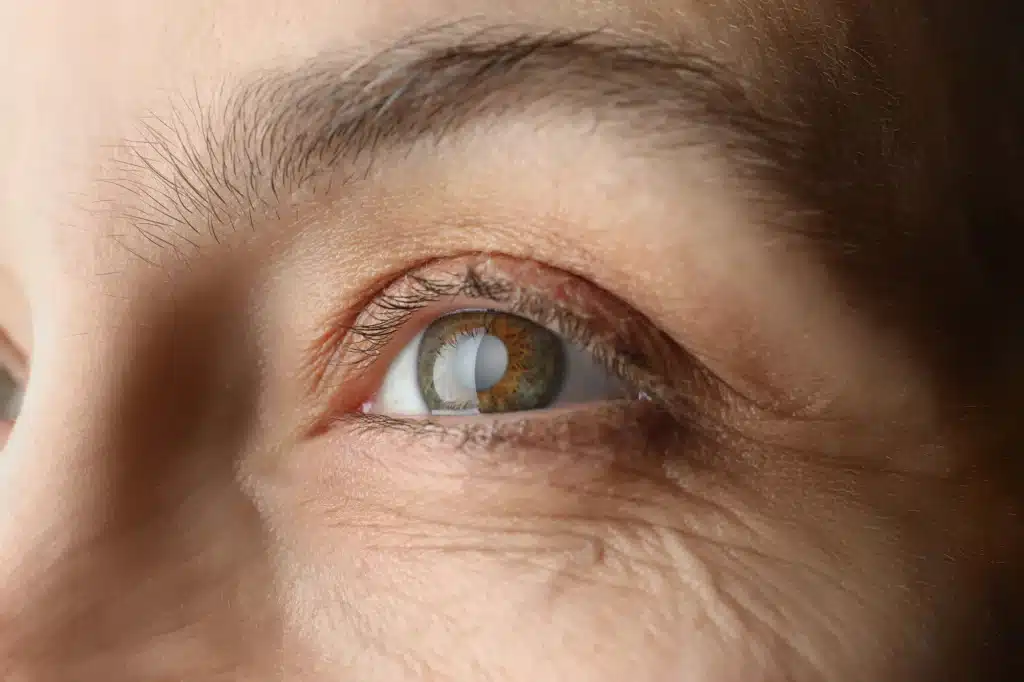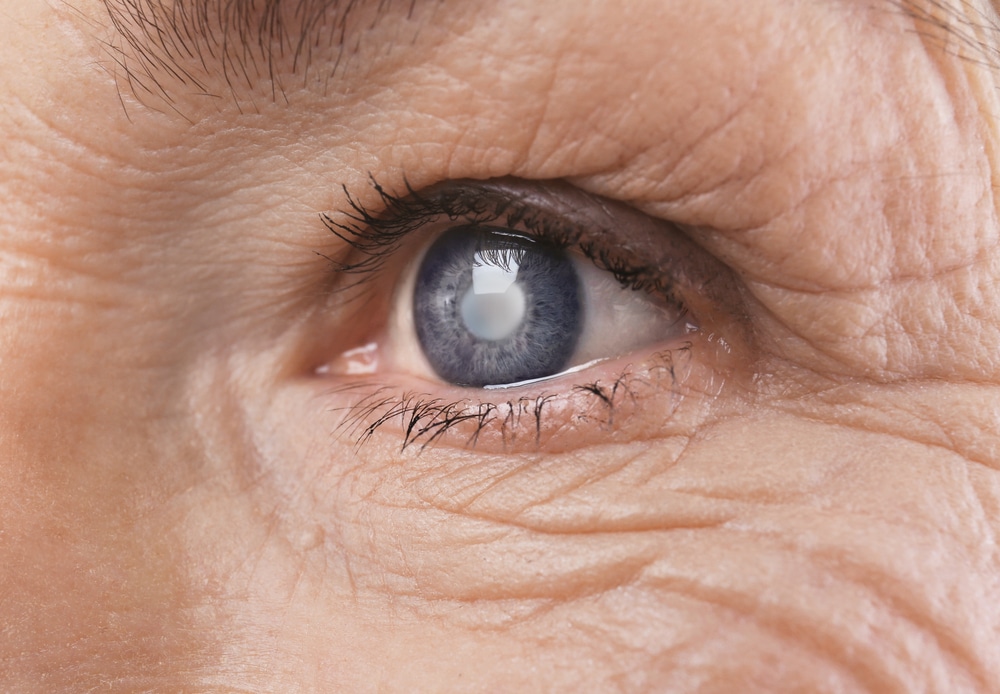Medically Reviewed by: Mark L. Mayo, M.D.
What Are the Most Common Problems After Cataract Surgery?
Cataract surgery is a highly effective procedure that restores vision in individuals suffering from the clouding of the eye’s natural lens. While most patients experience no complications and enjoy a significant improvement in their eyesight, some side effects can occur after surgery. In this article, the cataract surgeons from Eye Center of Texas will explore the answer to the question “What are the most common problems after cataract surgery?” by examining some of the typical side effects, including:
- Mild discomfort and itching
- Cloudiness and/or blurry vision
- Light sensitivity
- Specks or floaters in vision
- Swelling
- Eye infection
Continue reading for insight into what patients might expect following cataract surgery in Houston and advice on managing these side effects effectively.
Continue reading about cataracts:
What are cataracts?
What causes cataracts?
1. Mild discomfort and itching after cataract surgery
Mild discomfort and itching are among the most common and immediately noticeable problems after cataract surgery, because it is natural for the eye to feel slightly irritated while it heals. Patients are strongly advised against rubbing or pressing on their eye, as this can exacerbate the irritation and potentially lead to complications.
To manage these symptoms, your surgeon may recommend over-the-counter pain relievers and prescribe eye drops to reduce inflammation and prevent infection. Typically, these discomforts diminish significantly within a few days post-operation, but it’s crucial to follow your surgeon’s care instructions closely and report any severe or lasting symptoms immediately.
2. Cloudiness and/or blurry vision after cataract surgery
Cloudiness and/or blurry vision after cataract surgery is a prevalent concern among patients, but in many cases, cloudiness or blurry vision may not be a side effect from the cataract surgery at all.
Rather, it may be the result of your eye getting used to its new lens. This phenomenon typically stems from the natural adjustment of the eye to the new intraocular lens (IOL) implanted during the procedure or from slight swelling of the cornea. Most patients state that their vision becomes less cloudy only 48 hours post-op but keep in mind, if you have floaters, they may be more visible now that you are seeing through a clear lens.
Typically, patients who opt for Monofocal IOLs (the standard IOL that’s covered by most insurances) can expect a slightly longer time before adjusting to their new vision. This is because Monofocal lenses only correct nearsightedness or farsightedness, but not both.
Patients typically opt to correct for nearsightedness (for seeing far away objects) and then rely on glasses to help them see objects which are close-at-hand.
3. Sensitivity to light after cataract surgery
Sensitivity to light after cataract surgery is another common symptom that patients may experience during cataract surgery recovery. This condition, known as photophobia, usually dissipates a few days following the procedure as the eye heals. During this time, the pupil is adjusting to the new intraocular lens and the increased clarity of vision, which can lead to an increased sensitivity to bright lights or glare.
Wearing sunglasses when outdoors and avoiding harsh indoor lighting can help manage this sensitivity effectively. It’s also beneficial to use artificial tears if the eyes feel dry or irritated, as this can sometimes exacerbate sensitivity to light.
Over time, as the eye adapts to the IOL and recovers from surgery, light sensitivity should markedly decrease. However, if severe light sensitivity persists, it’s essential to consult with your surgeon, as it may indicate underlying issues that need attention.
4. Specks or floaters in vision after cataract surgery
Seeing specks or floaters in your vision after cataract surgery can be alarming, but it’s often not a cause for concern. These small, dark shapes or lines may appear to drift across your field of vision and are commonly caused by tiny bits of protein or debris trapped in the vitreous, the gel-like substance that fills the eye.
After cataract surgery, these particles can become more noticeable as they move around inside the eye due to changes in pressure during the procedure. In most cases, these floaters will eventually settle and become less bothersome. However, if they persist or increase in number over time, it’s important to consult with your doctor as it may indicate a more serious issue such as inflammation or bleeding within the eye.
5. Swelling after cataract surgery
Swelling of the eye area is a common reaction following cataract surgery, typically manifesting as puffiness around the eyelids or within the eye itself. This occurs as the body’s response to the surgical intervention and the healing process that follows.
To alleviate swelling, patients are advised to use cold compresses gently applied to the affected area and to keep their head elevated, especially during sleep, to reduce fluid accumulation. Additionally, your surgeon may prescribe anti-inflammatory medication or eye drops to help manage swelling and discomfort. Usually, the swelling diminishes significantly within the first few days post-surgery, but in some cases, it may take a couple of weeks to fully resolve.
Like most side effects after cataract surgery, continuous monitoring of the swelling is crucial; if it worsens or is accompanied by severe pain or vision changes, immediate medical attention should be sought as it could indicate complications requiring prompt treatment.
6. Eye infection after cataract surgery
While infections following cataract surgery are rare, they represent a serious potential complication. The primary concern is endophthalmitis, an inflammation of the interior of the eye caused by infection, which can lead to significant vision loss if not treated promptly and effectively.
Symptoms of an eye infection can include severe pain, redness, blurred vision, and discharge from the eye. To minimize the risk of infection, patients must adhere to post-operative care instructions meticulously, such as using prescribed antibiotic eye drops, avoiding rubbing or touching the eye, and keeping water away from the eye during the initial healing period.
While in most cases infections can be managed effectively and risks can be mitigated, you’ve got to act fast, because infections can become dangerous quickly.
What to expect: cataract recovery timeline
The recovery timeline for cataract surgery and laser cataract surgery procedures varies from patient to patient, but typically patients start to notice an improvement in their vision within a few days after the procedure. However, it’s important to note that complete healing can take up to 3-6 weeks.
During the initial weeks of recovery, patients may experience fluctuations in their vision or mild discomfort, which gradually subsides over time. Outside of initial blurriness and dry eyes, side effects and problems after cataract surgery are infrequent and rarely threatening.
First 24 to 48 hours post-surgery
During the first day or two after surgery, it’s common for patients to have blurry vision as the eye starts to heal and adjust. It’s essential during this period to rest the eyes and avoid any strenuous activities or heavy lifting, which could strain the eyes and impact the healing process.
First week post-surgery
Most patients find that their vision significantly improves within the first week after surgery. It’s crucial to continue following the post-operative care instructions provided by the ophthalmologist, including using the prescribed eye drops to prevent infection and reduce inflammation.
Six weeks post-surgery
By the six-week mark, most patients have fully recovered from cataract surgery and have stable vision. Throughout the recovery period, even after your vision has stabilized, wearing sunglasses to protect your eyes from bright lights and UV rays is recommended, at least until you’ve had a chance to follow up with your ophthalmologist. It’s important to have a follow-up appointment with your ophthalmologist to ensure the eye is healing correctly and to assess if any further treatment is needed.
What to expect from cataract surgery at Eye Center of Texas
What are the most common problems after cataract surgery? Most of the common issues that arise after cataract surgery are standard-issue for the recovery process. While the recovery process from cataract surgery is notably smooth and quick for the majority, it’s essential to keep an eye out for the most common problems after cataract surgery, so that you can address any complications as they arise.
Having performed over 80,000 successful cataract surgeries in our facilities across Texas (including Houston/Bellaire, Pasadena, Sugar Land, Clear Lake, Katy, and The Woodlands/Conroe), the surgeons of Eye Center of Texas have transformed the lives of thousands of patients and can help answer any questions you have about the process.
Put your vision in the hands of nationally renowned blade-free cataract surgery surgeons, and request an appointment online today to get started on your journey to better vision.
More Helpful Articles by Eye Center of Texas:
- What is the Average Age for Cataract Surgery?
- Pros and Cons of Photoreactive Keratectomy
- LASIK Surgery Age Limit
- Why is My Vision Getting Worse?
- Patients Say We Are the Best Ophthalmologists in Houston
Related Articles
Financing Options Available
Apply today to find a financing option that meets your needs.
Our Locations
Houston/Bellaire
6565 W. Loop S., Suite 650Bellaire, TX 77401
Medical Office:
713-797-1010
Medical Fax:
713-357-7276
LASIK/Near Vision:
Office: 713-395-1515
Fax: 713-357-7278
Pasadena
4415 Crenshaw RoadPasadena, TX 77504
Medical Office:
281-977-8800
Medical Fax:
281-977-8877
Sugar Land
15200 S.W. Freeway, Suite 130Sugar Land, TX 77478
Medical Office:
281-277-1010
Medical Fax:
281-277-4504
Clear Lake
455 E. Medical Center Blvd., Suite 110Webster, TX 77598
Medical Office:
281-332-1397
Medical Fax:
281-282-9152
Katy
Greenhouse Medical Plaza2051 Greenhouse Road, Suite 110
Houston, TX 77084
Medical Office:
713-797-1010
Medical Fax:
281-214-2971
The Woodlands/Conroe
100 Medical Center Blvd., Suite 118Conroe, TX 77304
Medical Office:
713-797-1010
Medical Fax:
936-647-1620


